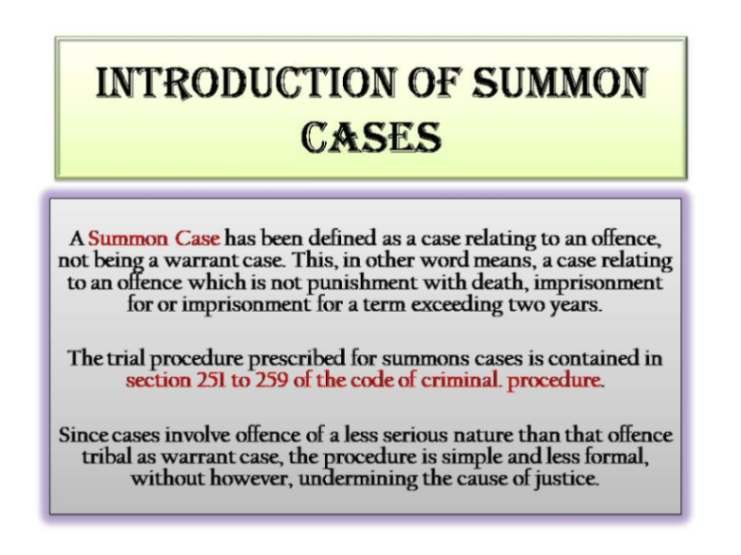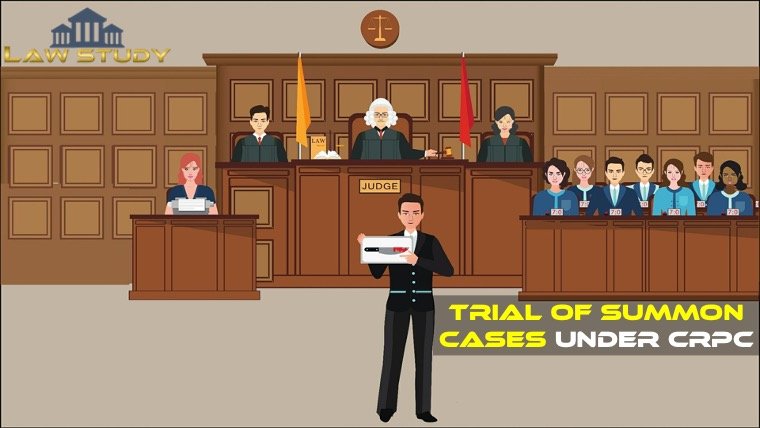Introduction of the Trial of Summon Cases under CrPC: – This article focuses mainly on the summons case procedure. The basic steps of a proceeding in a summon case are the same as in other trials, although this trial is less formal for a fast remedy.
A “Summon” is a legal document that orders the person whom it is served to appear in court & defend the complaint lodged against him. The accused is summoned by the Magistrate u/s 204(1) (a) of the Cr. P.C, 1973.
Summon Case

A case involving an offence that is not a warrant case is referred to as a “Summon Case“. Summon cases are based on the notion of a warrant case, which is a crime penalized by life imprisonment, life in prison, death or imprisonment for a period of more than two years.
As a result, summons cases are those with a maximum punishment of 2 years in prison. It might be stated that summons cases aren’t particularly severe, thus they should be addressed promptly while adhering to the rules of a fair trial. The procedures for dealing with such matters as provided in sec. 251 to 259 of the Crpc, 1973, but it isn’t as severe or rigorous as other trials
Trial Procedure in Summon Cases
Explanation of the offence’s particulars: Although sec. 251 specifies that framing accusations is not needed, it doesn’t restrict the accused from explaining the nature of the offence when the offender/ accused brings or appear before the court. This is done in order to make the accused aware of the charges made against him.
If the particulars cannot be conveyed, the trial will not be vitiated, and the accused will not be prejudiced, as this irregularity is remediable u/s 465 of the code. Sec. 251 requires courts to ask the accused whether he or she pleads guilty, and sec. 252 and 253 must be followed if the accused pleads guilty.
Conviction based on a Guilty Plea
Sec. 252 & 253 provide for conviction after a guilty plea. In general, sec 252 provides for a guilty plea, whereas section 253 provides for a guilty plea in minor cases. If the accused pleads guilty and the response is affirmative, the court will record the plea in the accused’s exact words, on the grounds of which the accused can be convicted at the Court’s discretion. If the response is no, the court must follow the processes outlined in Sec. 254.
If the accused pleads guilty yet the allegations against him do not amount to an offence, his plea will not result in his conviction. Because the magistrate has the discretionary powers to convict on the accused’s plea, if the accused is convicted on the plea, the magistrate must proceed as per sec. 360; otherwise, the magistrate shall examine the accused on the question of sentence & sentence him as per law. If the guilty plea is not accepted, the magistrate shall proceed as per sec. 254.
Procedure if accused isn’t convicted based on his plea
Sect. 254 addresses both the defence & prosecution cases if the accused is not convicted based on his or her plea u/s 252 & 253.
The Prosecution’s Case
The accused will be heard and all evidence will be taken before the magistrate. The prosecution will be allowed to open its case during the hearing by presenting the facts & circumstances that constitute the matter as well as disclosing the evidence on which he relied to prove the allegation. On the prosecution’s request, the magistrate summons any witnesses to attend & produce any material or document. Per Sec. 274, the magistrate will prepare an evidence memo. Similarly to other trials, the magistrate will follow Sec 279 (interpretation of facts & evidence to the accused) and u/s 280, recording the demeanour of the witnesses in summons cases.
Defence Case
In continuation of this, the court will further proceed with the defence hearing u/s 254 after the prosecution evidence under section 254 and the examination of the defence u/s 313. (1). During the defence hearing, the accused will be asked what he or she has to say in response to the prosecution’s evidence. Failure to hear the accused in any circumstance constitutes a fundamental violation in the criminal trial and cannot be cured u/s 465. The accused’s evidence will be recorded in the same method as in the matter of prosecution u/s 274, 279, & 280. Following the submission of the defence’s evidence, he will be permitted to submit his arguments u/s 314.
Conviction or Acquittal
If the magistrate concludes that the accused is not guilty after recording the evidence u/s 254, he will acquit him. If the accused is found guilty, the Magistrate shall further proceed u/s 360 or 325, otherwise, the accused must be punished in accordance with the law.
Complainant’s Non-appearance or Death
As per sec 256, the absence of the complainant on the date specified for the accused’s presence empowers the court to acquit the offender/accused unless the court has a reason to adjourn the case to another day. Sec 256(1) also applies in the event of the complainant’s death. If the representative of the deceased complainant does not appear for fifteen days where the accused appeared, the defendant/accused may be acquitted.
In the case of a Summon, defendant is discharged
Sec. 258 empowers the first-class Magistrate to stop the proceedings at any stage with the CJM’s prior approval. As a result, if he concludes the procedure after the record of the evidence, it is an acquittal judgement, and if he ends it ‘before the record of the evidence, it is a release judgement, that has the result of the discharge.
It is questionable that in a summons case filed on a complaint, the Magistrate has no discretion to dismiss the case even if he lacks adequate grounds to continue against the accused. This is because if the Magistrate does so, he will be recalling his own decision. The Apex court stated that the issue of process is the Magistrate’s interim order, not the verdict and that it can be recalled. In such cases, no provision in the law is required to allow the magistrate to dismiss the case.
In summons proceedings on the complaint, the Magistrate cannot discharge, review, or rescind the order of the process’s issuance. The case cannot be dropped; the trial court must complete the trial.
The trial court Magistrate has no authority to dismiss a summons proceeding in the absence of a statutory provision. In such cases, a person may apply with the H.C u/s 82 of the Cr.P.C.
There is no provision & possibility for discharge in summons cases initiated based on a complaint; the offender/accused will be found guilty (convicted) or not guilty (acquitted)
Conclusion
The Trial of Summons matters is less formal than other trial procedures to provide a quick remedy. As a result, Sec. 258, which does not allow the Magistrate to dismiss the case even in the lack of substantial grounds, is prejudicial to the accused. According to the Court’s decision in the K.M. Matthew case, the Magistrate has the implied ability to dismiss the case if the accusation against the accused doesn’t prove the conduct of any crime.

























